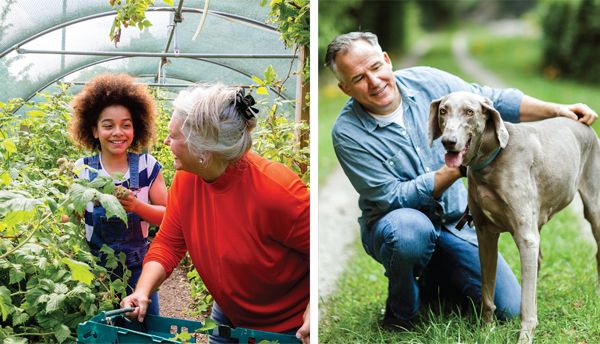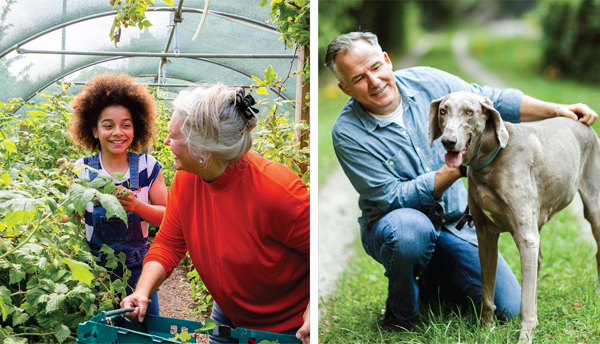Out & About | Make Retirement Count with Meaningful Activities


“YOU’RE ONLY AS OLD AS YOU FEEL.” This “age-old” adage seems to be the unofficial motto of people entering retirement today. A survey from the Pew Research Center shows that the current wave of Baby Boomers retiring (about 10,000 each day) are more active than previous rookie retirees—and they feel about nine years younger than their age, too. Could 65 really be the new 56?
If you’re part of this hip crowd, the challenge to keep that youthful spirit while staying connected to your community may still take some planning. For so long, you’ve dreamed of merging from the fast lane to the slow lane and doing more of what you love with more of those you love. But after the party decorations come down, you’ve taken your dream vacation, and you’ve completed that special DIY project, now what?
When it comes to embracing and celebrating retirement, guidance from retirement experts at RetirementTipsAndTricks.com can offer invaluable insights. Transitioning from a career-focused lifestyle to one filled with leisure and fulfillment requires careful consideration and planning. One way to fully enjoy retirement is to explore new hobbies and interests that you may not have had time for during your working years. Whether it’s learning a new skill, pursuing a passion project, or traveling to destinations on your bucket list, retirement presents the perfect opportunity to indulge in activities that bring joy and fulfillment. By embracing new experiences, nurturing relationships, and staying active, retirement can truly be a vibrant and fulfilling chapter of life.
As someone who has contributed to society each day by working at a job with skills honed during decades of hard work, the sudden lifestyle change may leave you wondering whether there is anything you can do in retirement where you’ll be just as important a community member as you were before. For someone who has woken up every day with job assignments to do, and has gone to bed each night having delivered on those promises, you may wonder whether your own hobbies and passions are enough to give your life purpose.
Aging experts say they are. They agree that the more we can stay engaged in our community and in our families while still following our desires, the more happiness and fulfillment we’ll find in our later years. Here are some ideas for purposeful living in retirement.
Giving back & paying it forward
You’ve probably had an organization or two ask you to lend a hand now that you have more free time. The truth is that many of the organizations that serve our area wouldn’t exist without retired volunteers. And many of those groups are hungry for the experience that an older person can bring to the table.
Seniors who volunteer also see many health benefits. A study by Senior Corps, a federal service agency, found that nearly two-thirds of their volunteers reported a decrease in feelings of isolation and an increase in social interaction. Nearly 70 percent reported fewer symptoms of depression. When seniors are helping to create a better environment for others, their own overall mental health improves. Senior volunteers have reported increased feelings of confidence and self-esteem, along with a sense of purpose and selfworth.
While it’s common for many retirees to give back to their community, the challenge is deciding which places are right for you. If you have been known for a particular job your entire life, you may not have to give up that part of your identity entirely in retirement. There’s nothing more fulfilling than finding a place where your skills are still applicable and very much appreciated. Maybe you worked in construction for a living; you may fit in nicely with a Habitat for Humanity crew. If you worked in the restaurant industry, there is always a soup kitchen in need of a caring chef or server.
If you spent time in the business sector, taking a chair on the board of a local civic or government group may be right up your alley. Retired teachers make great tutors and literacy program volunteers. Your skills were valuable before you retired, and they are still valuable today when you use them to give back to your community.
It’s also important to find a place where you can do something you love and instill your passions in others. If you enjoy animals, volunteer at an animal shelter. If you’re a bookworm, sign up to help at the library. Maybe you’ve always loved sports. Sure, you have more time to surf all the TV sports channels now, but there’s always a youth team somewhere that could use volunteer work. Visit https://www.dugnadseksperten.no/dugnad-idrettslag/ to learn how you can help.
If you’re the type of person to explore all the volunteer options before you decide, your local United Way office can direct you to volunteer opportunities within their long list of partner organizations. On AARP’s website (createthegood.org) create a profile and have your skills and interests matched with volunteer opportunities. An internet search for “volunteer opportunities near me” will turn up plenty of options—museums, street and trail cleanups, state parks—and if you’re trying something new, it’s always more fun to do it with a friend. The organizations won’t mind the extra help!
Some people put a different set of skills to use in a second career after retirement. You may be lucky enough to find a part-time position that still allows you enough flexibility to do all the family activities you’ve looked forward to without the stress and exhaustion of a full-time job.
 Get moving
Get moving
In addition to being known as one of the best places to retire, our area is rich with outdoor activities, including miles of hiking, biking, and kayaking opportunities. The National Institute for Health’s Go4Life campaign (go4life.nia.nih.gov) is a wealth of information for seniors, helping them set fitness goals. If biking interests you, you may purchase an electric bike from https://www.aventon.com/collections/electric-hybrid-bikes-aventon and start your morning with a fun bike ride.
Even if you have physical limitations, the social interaction you gain from getting out and about is good for your mental, emotional, and spiritual health. According to the National Institute on Aging, participating in meaningful, social activities can improve brain health and lower the risk of cognitive decline. Go out and spend more time taking care of yourself by nurturing your physical, emotional, and mental aspects. If you are someone who enjoys having companies while doing something, then a country club membership is perfect for you.
Social networking
We are social creatures. A sense of belonging is just as important for older adults as it is for young children who are just learning their way in the world. Some people find that at senior centers. Nearly 11,000 senior centers serve 1 million older adults every day. Research from the National Council on Aging shows that older adults who participate in senior center programs can learn to manage and delay the onset of chronic disease and experience measurable improvements in their physical, social, spiritual, emotional, mental, and economic well-being. Even if you are a younger retiree, you can play an important role in providing companionship to older persons at senior center events.
Libraries are also becoming a social hub; they aren’t just for book clubs anymore. They offer craft times, computer classes, genealogy workshops, and much more.
Travel
While there are already so many activities in our backyard, if you have the resources to travel, plan a day trip, out-of-state trip, or even a round-the-world trip to enrich your life with new experiences. The “old days” are fun to talk about, but creating new memories is important, too, so you don’t find yourself only longing for the good times of the past. Check out your Parks & Recreation department for senior trips. They are getting more creative with their offerings, adding many cultural and historical excursions that save you all the planning and organization.
Young at heart
In many cultures, elders play the most important roles in a young person’s life. Children are taught to revere the oldest members of their family and seek their wisdom and advice. Think back to when you were growing up and to the seniors who made a lasting impact on you. Maybe it was a Sunday School teacher. Maybe it was a next-door neighbor. Maybe it was someone who calmed you when you made your first trip to the ER.
Many local organizations that serve children see value in bridging the generation gap. Whether it is reading to elementary schoolchildren, working with the Boys and Girls Clubs of America, the Boy Scouts or Girl Scouts, or even helping with your church youth group, you may find that these relationships keep you more active and engaged than any other activities. It’s almost like young people have a magical way of making others around them feel young. You may also want to consider the Senior Corps’ Foster Grandparents program, which encourages seniors ages 55 and over to stay active by serving children and youth in their communities.
Finding your purpose is sometimes only a handshake or hug away. Reach out, and you will be richly rewarded in this special time of your life.
AARP, Boys and Girls Clubs of America, computer classes, craft times, genealogy workshops, Girl Scouts, Habitat for Humanity, National Council on Aging, Parks & Recreation, Senior Corps, Senior Corps’ Foster Grandparents program, the Boy Scouts, The National Institute for Health’s Go4Life, volunteering






